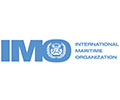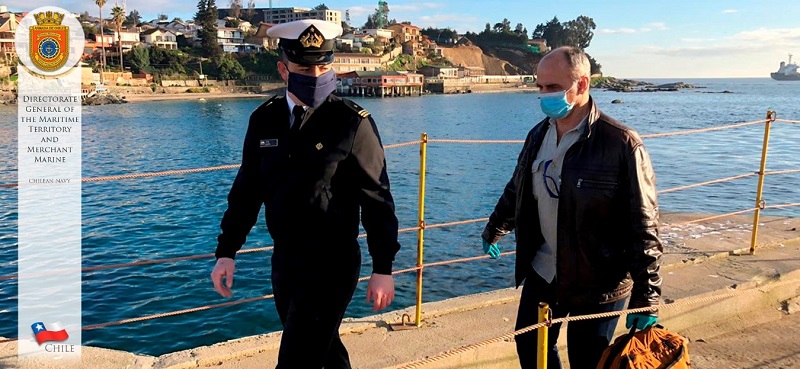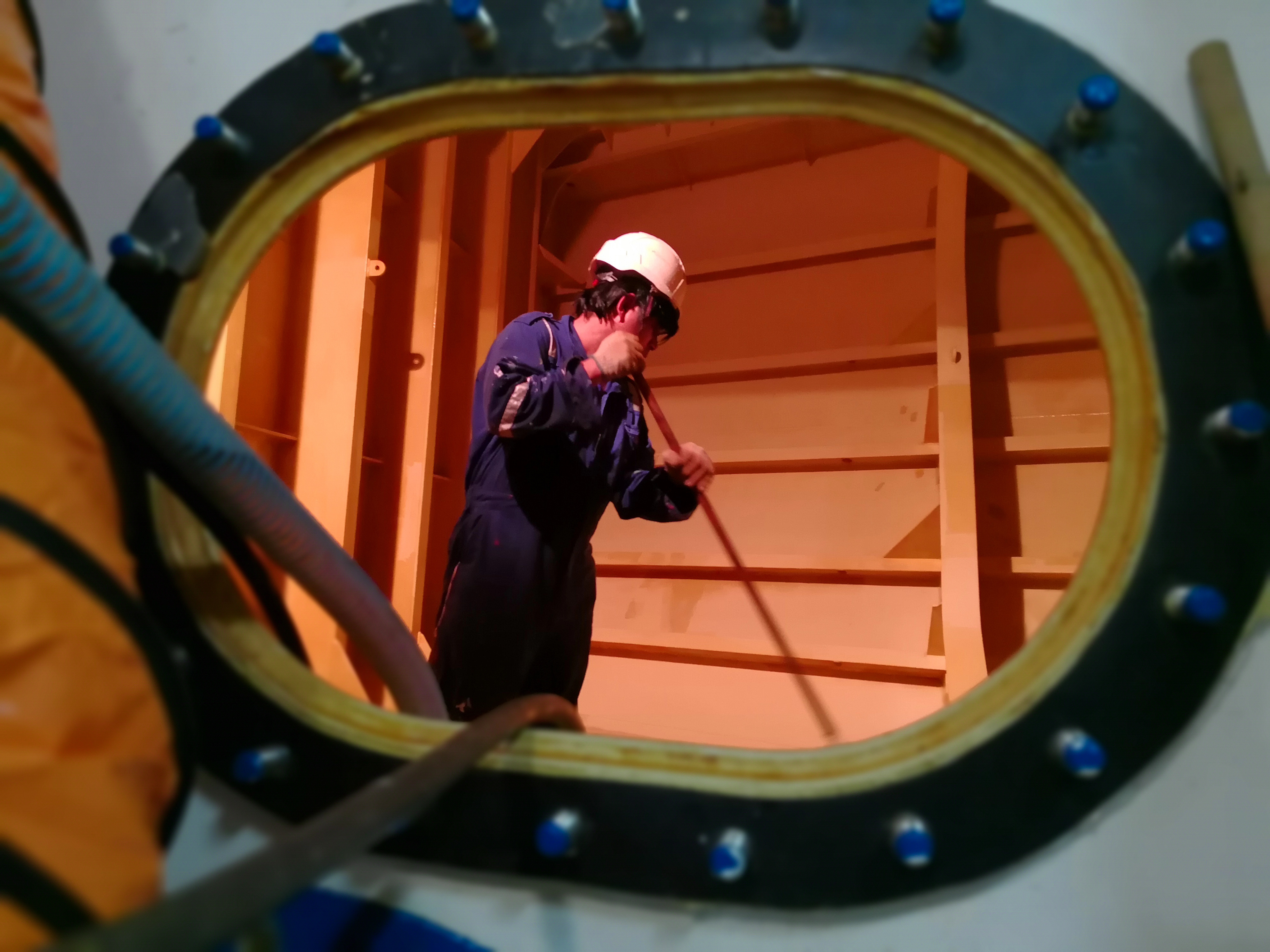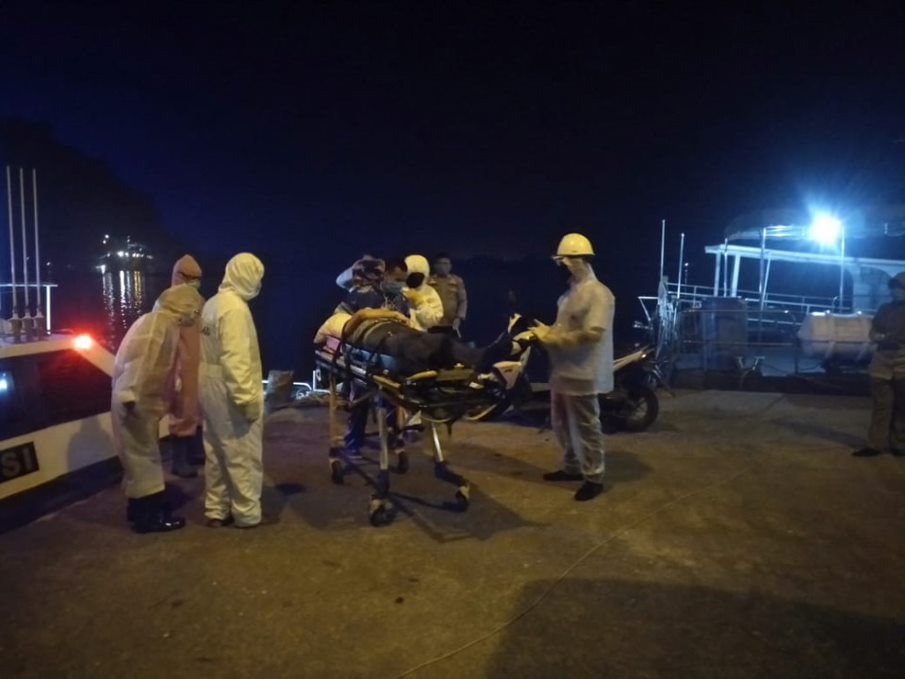

The COVID-19 pandemic has put seafarers around the world in precarious situations. As of July 2021, It is estimated that 250,000 seafarers are currently stranded on ships beyond the end of their original contracts and unable to be repatriated, due to COVID-related travel restrictions. A similar number of seafarers are stuck at home, unable to join ships and provide for their families. (Click here for our comprehensive FAQ on crew changes and repatriation).
IMO’s Seafarer Crisis Action Team (SCAT) is working to help resolve individual cases, alongside other organizations like the International Labour Organization (ILO), the International Transport Workers’ Federation (ITF) and the International Chamber of Shipping (ICS). IMO’s SCAT team works around the clock – contacting representatives from national governments, NGOs, trade unions or relevant associations, or orienting seafarers towards the right organisation, to find solutions. To date SCAT has dealt with over 500 cases involving thousands of individual seafarers.
Seafarers and their relatives can contact the SCAT by sending an email to [email protected]
Helping Seafarers Go Home – some examples where IMO intervention made a difference.
Assisting a young mother during a round-the-world effort to return home
On 28 October 2020, IMO’s Seafarer Crisis Action Team (SCAT) received an email from a seafarer who recounted an incredible story of endurance and perseverance driven by her desire to return home to loved ones. The young mother from the Pacific, with eight years seagoing experience, had initially signed on for a three-month trip, but suddenly found her intended way home from the Antarctic blocked by a port State’s decision to suspend international flights as part of its COVID-19 response.
Like many other seafarers, the entire ship’s crew found themselves confined to ship and held at anchor. They made the decision to sail to Europe, despite only having limited provisions aboard. The voyage took 82 days and, after arriving safely, the seafarer then spent four months trying to arrange a repatriation flight.
On the final leg of her journey home the seafarer’s plans were once again thwarted by COVID-19 travel restrictions. While she remained in good health and high spirits, she was desperate to return home – the feeling intensified by how close she was to reaching her goal. At this juncture, after exhausting other avenues, the seafarer contacted SCAT and asked for help.
SCAT immediately reached out to the port and seafarer States and NGOs in consultative status with IMO and asked for their assistance. Within 24 hours, after a concerted effort by its COVID-19 Task Force, the seafarer State’s Alternate Representative to IMO confirmed that the seafarer would be allocated a seat on the next repatriation flight.
On 1 December 2020, after an 11 month around-the-world odyssey, the seafarer was finally reunited with her loved ones. The seafarer emailed her thanks to SCAT and said she was “so thankful to be with my family”.
Repatriating distraught seafarers after operator went bankrupt
After enduring months of uncertainty, 17 distraught seafarers contacted their trade union on 15 June 2021 to report that they were “mentally, physically and emotionally tired of working”. Their ship had been arrested three months previously, due to a cargo dispute, and the owner had recently declared itself bankrupt.
Despite their company’s endeavours to repatriate them, they could not meet the strict crew change requirements of the port State because the ship was not trading. The situation was further compounded by strict border controls implemented between the port State and seafarer State in response to the second wave of the COVID-19 pandemic.
Frustrated about the lack of information, being kept on board the ship, and the persistent late payment of wages, the crew resorted to contacting their trade union, which in turn informed the seafarers’ State. On 21 June the secretariat of a Port State MoU brought the stranded crew’s difficulties to the attention of the IMO’s Seafarer Crisis Action team (SCAT).
After urgently referring the matter to relevant States and maritime stakeholders, the port State reassured SCAT that it was aware of the situation and had been “working closely with the shipowner, unions and the flag State to resolve the matter and assist the seafarers”. It also confirmed that it had facilitated the sign-off of eight crew members and would continue to work on the matter with the relevant stakeholders towards a resolution.
On 14 July the port State informed all parties that the ship had departed its waters and the remainder of the crew would be changed at the ships next port call. The secretariat of the Port State MoU emailed to “thank all for your updates and action taken for helping …. Seafarers.”
Relief at repatriation after 5 months extra on board
After signing on for a six-month contract in September 2019, a seafarer still found himself on board his ship at the beginning of August 2020, over five months after he had served out his contract. He was concerned about the risk to his physical and mental health and was convinced that it was no longer safe for him to remain on board.
His ship was operating on a fixed route between two port States in Southeast Asia. However, his requests for repatriation from one of them had been rejected due to the State’s strict COVID-19 border controls, and he felt his company was not interested in making the necessary arrangements to enable his repatriation from the other. The seafarer’s reliever had also already joined the ship and had assumed his duties after they were properly handed over to him. The seafarer felt there was no justification for keeping him on board the ship and, on 12 August 2020, he requested assistance from IMO’s Seafarer Crisis Action Team (SCAT) to facilitate his repatriation during the ship’s next port call.
This ship was scheduled to arrive at the port on 14 August 2020. Conscious of the pressing timeline, IMO SCAT sought urgent action from the relevant States and NGOs. Responding on the same day, the flag State reaffirmed its commitment to ensuring the provisions of the Maritime Labour Convention were strictly adhered to throughout its fleet and offered its assistance. It immediately contacted the ship owner and manager and, after seeking the seafarer’s explicit permission via SCAT, confirmed the seafarer’s identity to the ship owner and manager, in order to inform and expedite their decision making and repatriation planning.
The seafarer contacted SCAT again on 17 August and said that although his ship was still berthed, he had not received a response from his company regarding his sign off. After a concerted effort by the flag State and SCAT, the seafarer was duly signed off and repatriated. On 28 August 2020, the seafarer confirmed that he had safely reached his country and thanked SCAT for its “help and support”.
Reuniting father and daughter
On 14 July 2020, IMO was contacted by the distraught daughter of a Second Engineer serving onboard a crude oil tanker. Her father was unable to disembark due to the COVID-19 pandemic and the associated challenges encountered by the ship’s management company of sending a relief.
In her email, she explained that her father had already served almost eight months at sea even though he was originally “supposed to sign off at the end of February 2020”. She was concerned that her father “is in very low mental and physical condition” and that he had just been hospitalized “due to problems with his back”. She feared his health would continue to deteriorate which could “lead to accident or tragedy”, particularly as he no longer had a valid medical Certificate because his employment contract had expired.
The email was forwarded to IMO’s Seafarer Crisis Action Team (SCAT). The SCAT immediately contacted the seafarer’s trade union organization and the maritime authorities of the flag, port and seafarer States concerned. The trade union, in turn, contacted the ship’s management company and liaised with the port State’s maritime authority, in this case the Chilean Maritime Authority, to resolve the matter.

Source: IMO
After a concerted effort by all parties the Second Engineer was successfully repatriated on 25 July 2020 and reunited with his family. The Chilean Maritime Authority received a letter of gratitude from the daughter who first brought the matter to the attention of the SCAT, and this motivated its Director General to reaffirm, to the IMO Secretary-General, its “commitment to the measures adopted by IMO and the work done by the SCAT for the benefit of seafarers in the world”.
Repatriated after more than 100 days offshore
On 10 May 2020, IMO was contacted by a fatigued seafarer on an offshore support vessel. He and many of his colleagues had spent 100 days offshore – some had already counted 140 days – with no break and no prospect of crew changes. The seafarer was worried because his employer was planning to extend crew contracts by another two months.
“We are all feeling the strains of the long period offshore especially having no end date in sight. To many of us that is not good and certainly puts safety on the line”, the seafarer wrote in an email to IMO’s Seafarer Crisis Action Team (SCAT).

Source: IMO
The SCAT brought the message to the attention of the relevant NGOs in consultative status with IMO and liaised with the maritime authorities of the flag and port States concerned.
Following this swift intervention from IMO, the port State confirmed it would take the necessary measures to facilitate crew change while the ship was in its port or terminal, and the seafarer was able to go home and be reunited with his family.
Protecting seafarers’ mental health
A seafarer onboard a container ship sent a call for help to IMO on 12 April 2020. His contract, which was due to finish at the end of March, had been extended for another month. The seafarer claimed that his company was failing to take action to change crew, even though government assistance made that option possible.
While the seafarer recognised that he and his colleagues were not in a critical situation physically, he described serious impacts on their mental health. “We have meals, everything is okay, but the main thing is our psychological health”, the seafarer told IMO’s Seafarer Crisis Action Team (SCAT) in his first email.
The SCAT referred the seafarer to the relevant national maritime administration and trade unions, while also bringing the matter to the attention of the flag and port States concerned. This diplomatic intervention helped resolve the case, and the flag State confirmed it would assist the seafarer with his contract and repatriation.
The seafarer and another crew member were able to return home safely in May. In an email, the seafarer warmly thanked a SCAT team member for his help and support, writing: “you are really a man with a big heart”.
A seafarer repatriated to assist her vulnerable relatives
A British seafarer was desperate to be reunited with her family after months working on a passenger ship in the Pacific. Her vulnerable relatives back home needed her support in the face of the COVID-19 pandemic, and she was determined to be by their side.
But her plan to fly home mid-March was derailed. Immigration authorities of the port State initially denied permission to travel, because the rules had been changed with almost no notice. The seafarer was stuck on the ship at anchor with no means of returning home.
On 31 March, she emailed a plea for help to IMO. “As I am sure is the case for so many other seafarers right now, I am so desperate to get home. My parents and grandmother are vulnerable and I cannot think about anything else”, she said. The seafarer added that her mental health was seriously affected, and she feared the situation would also impact her ability to perform her duties as a bridge officer.
IMO immediately contacted the port State and seafarer State and informed the relevant NGOs. Those efforts helped resolve the case. Thanks to the efficient cooperation between the local seafarer’s union and the port State, the seafarer was allowed to fly home on 12 April.
In a message sent to IMO the next day, she thanked the Organization and the port State for ensuring she could be reunited with her family. “I am relieved and overjoyed to be back! Thank you so much for all your help and support. I am also very grateful to [the port State] for allowing me to travel, the whole process was very well managed and controlled”, she said.
Access to medical care for seafarers
Securing urgent medical evacuation
On 14 May 2020, IMO received information about an emergency situation onboard a cargo vessel at anchor. A chief officer was suffering tremendous pain due to a swelling that was spreading from his gum to the left side of his face and part of his neck.
The vessel and charterer had requested a doctor visit to the ship five days earlier, but this was refused by custom authorities on the basis of COVID-related restrictions. During a video consultation, a doctor confirmed that emergency surgery was needed, as the risk of sepsis was very high. The seafarer’s health was deteriorating every day, and he was already very weak and unable to move.
Further attempts by the ship’s Master to secure medical evacuation were unsuccessful. Port authorities refused to allow the seafarer to disembark to receive the urgent medical care he needed, due to the 14-day quarantine requirements and because no quarantine hotels were available to host him.
His colleagues and the Master on board were fearful for the seafarer’s life. “It is very difficult to understand, that in such dangerous situation there is no proper support to save the life of a human”, one colleague wrote in a message that was transferred to IMO.
After being informed about the case, IMO’s Seafarer Crisis Action Team (SCAT) immediately intervened, in cooperation with ICS and ITF, and contacted focal points of the port State and the seafarer’s home State. Intense discussions and good collaboration helped resolve the case rapidly.
On 15 May, one day after IMO was informed of the situation, the SCAT got confirmation that the seafarer had been able to disembark and was being transferred to a hotel. As long as the COVID-19 test result was negative, he would be taken to hospital for the surgery he urgently needed.

Source: IMO
Spectacular rescue of a seafarer suffering a stroke
When a 45-year-old Russian seafarer aboard a large cargo ship began to show signs of suffering a stroke, in mid-April, the ship’s captain was immediately alerted.
The next day, the seafarer’s condition worsened. He seemed confused, his speech was laborious, he had pain under the left shoulder and his left arm and leg were paralysed. The captain knew he needed to act – and fast.
Global Voyager Assistance, a remote medical assistance provider, confirmed the stroke diagnosis. But the ship was more than 220 km from the nearest port, and the port authorities rejected initial appeals for emergency medical assistance, due to COVID-19 restrictions in place. Despite repeated requests from the vessel’s captain, the seafarer’s national trade union and that of the country the ship was headed for, the ship could not enter port.
After several hours of intense discussions, the ship initially received confirmation that the vessel could enter port for the medical transfer to take place. However, that decision was reversed just six hours before the ship was due to arrive, and the captain was advised to set course for another port, in a different country, over 600 km away.
The clock was ticking. The captain insisted and made a further request to obtain medical evacuation for the seafarer, but that second attempt was also rejected by the authorities, including immigration and a local COVID-19 Task Force – again due to COVID-19 restrictions.
The International Transport Workers’ Federation (ITF) was then notified. It called on two UN agencies, the International Maritime Organization (IMO) and the International Labour Organization (ILO), to intervene urgently at government level to ensure international conventions were respected so the seafarer could receive the immediate medical attention that his life depended on.
IMO and ILO quickly took action. IMO contacted representatives from the national government while ILO offered to prepare an intervention letter. As a result, the medical evacuation was finally authorised and a police vessel was dispatched to evacuate the seafarer.

Source: IMO
The president of the seafarer’s national union said: “After personally working on this case for over 48 hours, we are relieved our appeals were heard and our member was finally granted access to the medical treatment that he is entitled to. Our thoughts are now focused on [his] health, and we extend the best wishes of maritime unions worldwide to him and his family for his speedy recovery.”
“We want to sincerely thank [the local union] and the ITF for their assistance, and the ILO and IMO for their urgent intervention. Without their support we might not have succeeded in securing the lifesaving emergency evacuation and medical care”, he added.
Protecting Seafearer’s Health and Safety
Ensuring a safe working environment amid the pandemic
In late March, the Master and crew of a bulk carrier, all of Indian nationality, grew increasingly worried that unloading cargo would expose them to considerable risks of COVID-19 infection.
A lack of a floating crane at an Asian port meant that the ship personnel were faced with taking 60 stevedores on board for three weeks without any screening on COVID-19 symptoms. These stevedores would be living in makeshift tents on the vessel’s decks to discharge a cargo of soybeans.
“Ship’s crew is very concerned about exposure to shore personnel during cargo operations, as it is impossible to maintain total isolation”, the shipmaster and 19 crew members said in a letter transferred to IMO on 1 April.
IMO immediately contacted ITF and ICS. The flag State was invited to mediate a solution with the Master and the shipowner, and an agreement was reached on 7 April. The ship was relocated to a different anchorage and the cargo was fully and safely discharged.
Source: IMO